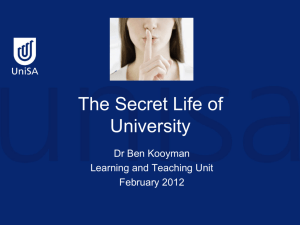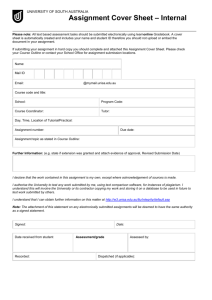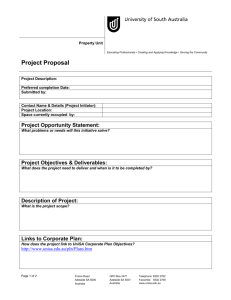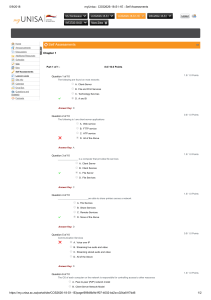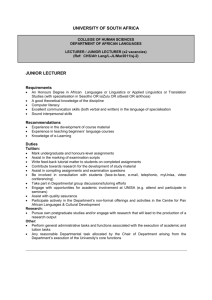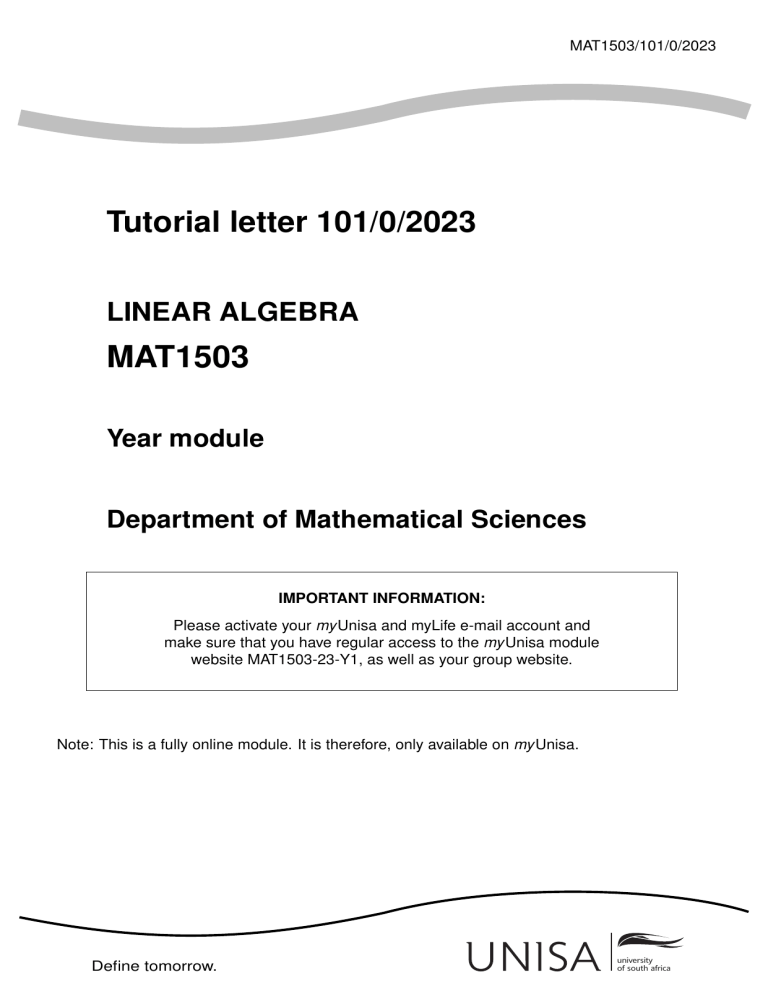
MAT1503/101/0/2023 Tutorial letter 101/0/2023 LINEAR ALGEBRA MAT1503 Year module Department of Mathematical Sciences IMPORTANT INFORMATION: Please activate your my Unisa and myLife e-mail account and make sure that you have regular access to the myUnisa module website MAT1503-23-Y1, as well as your group website. Note: This is a fully online module. It is therefore, only available on my Unisa. Define tomorrow. university of south africa CONTENTS Page 1 INTRODUCTION ..................................................................................................................4 1.1 Getting started......................................................................................................................4 2 OVERVIEW of MAT1503......................................................................................................4 2.1 Purpose ................................................................................................................................4 2.2 Outcomes .............................................................................................................................5 3 CURRICULUM TRANSFORMATION ..................................................................................5 4 LECTURER(S) AND CONTACT DETAILS ..........................................................................5 4.1 Lecturer(s) ............................................................................................................................5 4.2 Department ..........................................................................................................................6 4.3 University..............................................................................................................................6 5 RESOURCES.......................................................................................................................6 5.1 Joining myUnisa ...................................................................................................................6 5.2 Prescribed book(s) ...............................................................................................................7 5.3 Recommended book(s) ........................................................................................................8 5.4 Electronic reserves (e-reserves) ..........................................................................................9 5.5 Library services and resources ............................................................................................9 6 STUDENT SUPPORT SERVICES .....................................................................................10 6.1 First-Year Experience Programme .....................................................................................11 7 STUDY PLAN.....................................................................................................................12 8 HOW TO STUDY ONLINE? ...............................................................................................14 8.1 What does it mean to study fully online?............................................................................14 8.2 myUnisa tools .....................................................................................................................14 9 ASSESSMENT...................................................................................................................15 9.1 Assessment criteria ............................................................................................................15 9.2 Assessment plan ................................................................................................................15 9.3 Assessments due dates .....................................................................................................17 9.4 Submission of assessments...............................................................................................17 9.5 The assessments ...............................................................................................................18 9.6 Other assessment methods ...............................................................................................18 9.7 The examination .................................................................................................................18 2 MAT1503/101/0/2023 9.8 Supplementary ...................................................................................................................19 10 ACADEMIC DISHONESTY................................................................................................19 10.1 Plagiarism...........................................................................................................................19 10.2 Cheating .............................................................................................................................19 10.3 For more information about plagiarism, follow the link below: ............................................20 11 STUDENTS LIVING WITH DISABILITIES ........................................................................20 12 FREQUENTLY ASKED QUESTIONS................................................................................20 13 SOURCES CONSULTED...................................................................................................20 14 IN CLOSING ......................................................................................................................20 ADDENDUM A: Additional Notes and Curriculum Transformation.........................................21 ANNEXURE A: GLOSSARY OF TERM .......................................................................................22 ADDENDUM B: Assignments .....................................................................................................23 3 1 INTRODUCTION Welcome to the MAT1503 module. We trust that you will find it both interesting and rewarding. This tutorial letter contains important information about the scheme of work, resources and assignments for this module as well as exam admission. We urge you to read it carefully before working through the study material, preparing the assignment(s), preparing for the examination and addressing questions to your lecturers. In this tutorial letter, you will find the assignments as well as instructions on the preparation and submission of the assignments. This tutorial letter also provides all the information you need with regard to the prescribed study material and other resources. Please study this information carefully and make sure that you obtain the prescribed material as soon as possible. You will access all files online, a number of tutorial letters for example, solutions to assignments, during the year. These tutorial letters will be uploaded on myUnisa, under Additional Resources and Lessons tools on myUnisa platform. A tutorial letter is our way of communicating with you about teaching, learning and assessment. Right from the start we would like to point out that you must read all the tutorial letters you access from the module site immediately and carefully, as they always contain important and, sometimes urgent information. Because this is a fully online module, you will need to use my Unisa to study and complete the learning activities for this course. Please visit the website for MAT1503 on my Unisa frequently. The website for your module is MAT1503-23-Y. 1.1 Getting started Owing to the nature of this module, you can read about the module and find your study material online. Go to the website at https://my.unisa.ac.za and log in using your student number and password. Click on ”myModules” at the top of the web page and then on ”Sites” in the top right corner. In the new window, click on the grey Star icon next to the modules you want displayed on your navigation bar. Close the window in the top right corner. Then select the option ”Reload to see your updated favorite sites”. Now go to your navigation bar and click on the module you want to open. We wish you every success with your studies! 2 OVERVIEW of MAT1503 2.1 Purpose This module will be useful to students interested in developing the basic skills in linear algebra which can be applied in the natural sciences and social sciences. Students who have completed 4 MAT1503/101/0/2023 this module successfully will have an understanding of the basic ideas of linear algebra and be able to apply the basic techniques for handling systems of linear equations, matrices, determinants and vectors as well as complex numbers. 2.2 Outcomes The broad outcomes for this module are to: 2.2.1 solve systems of linear equations and interpret the solutions. 2.2.2 perform basic matrix operations. 2.2.3 evaluate determinants and use them to solve certain systems of linear equations and to find inverses of invertible matrices. 2.2.4 perform various operations in 2-space, 3-space and n-space and to find equations for lines and planes in 3-space. 2.2.5 express complex numbers in Polar form, solve polynomial equations of a complex variable. 2.2.6 extract nth roots of any complex number where n ∈ N. 2.2.7 express relationships between trigonometric functions using complex numbers. 3 CURRICULUM TRANSFORMATION Unisa has implemented a transformation charter based on five pillars and eight dimensions. In response to this charter, we have placed curriculum transformation high on the teaching and learning agenda. Curriculum transformation includes the following pillars: student-centred scholarship, the pedagogical renewal of teaching and assessment practices, the scholarship of teaching and learning, and the infusion of African epistemologies and philosophies. These pillars and their principles will be integrated at both programme and module levels as a phased-in approach. You will notice a marked change in the teaching and learning strategy implemented by Unisa, together with how the content is conceptualised in your modules. We encourage you to embrace these changes during your studies at Unisa in a responsive way within the framework of transformation. 4 LECTURER(S) AND CONTACT DETAILS 4.1 Lecturer(s) The primary lecturer for this module is: Dr Ali Department: Mathematical Sciences Telephone: 011 670 9163 E-mail: alizi@unisa.ac.za 5 A notice will be posted on myUnisa if there are any changes and/or an additional lecturer is appointed to this module. Please do not hesitate to consult your lecturer whenever you experience difficulties with your studies. You may contact your lecturer by phone or through correspondence or by making a personal visit to his/her office. Please arrange an appointment in advance (by telephone or by e-mail) to ensure that your lecturer will be available when you arrive. Please come to these appointments well prepared with specific questions that indicate your own efforts to have understood the basic concepts involved. If these difficulties concern exercises which you are unable to solve, you must send us your attempts so that we can see where you are going wrong. If you should experience any problems with the exercises in the study guide or prescribed book, your lecturer will gladly help you with them, provided that you send in your bonafide attempts. When sending in any queries or problems, please do so separately from your assignments and address them directly to your lecturer. 4.2 Department You can contact the Department of Mathematical Sciences as follows: Department of Mathematical Sciences Departmental Secretary: 011 670 9147 (RSA) e-mails: mathsciences@unisa.ac.za or 4.3 +27 11 670 9147 (International) swanem@unisa.ac.za University To contact the University, follow the instructions on the Contact us page on the Unisa website. Contact addresses of the various administrative departments appear on the Unisa website: http://www.unisa.ac.za/sites/corporate/default/Contact-us/Student-enquiries Please include the student number in all correspondence Whenever you contact a lecturer via e-mail, please include your student number in the subject line to enable the lecturer to help you more effectively. 5 RESOURCES 5.1 Joining myUnisa The myUnisa learning management system is the University’s online campus which will help you communicate with your lecturers, other students, and the administrative departments within Unisa. To claim your myUnisa account, please follow the steps below: 1. Visit the myUnisa website at https://my.unisa.ac.za/portal 2. Click on the ”Claim Unisa login” link on the top of the screen under the orange user ID box. 3. A new screen will load, prompting you to enter your student number. Please enter your student number and click ”continue”. 6 MAT1503/101/0/2023 4. Enter your surname, your full name, your date of birth and, finally, your South African ID number (for South African citizens) OR your passport number (for foreign students). Then click ”continue”. Remember to enter either an ID number or a passport number, NOT both. 5. Please read through the guidelines and click all the check boxes to acknowledge that you have read all the information provided. Once you are done, click the ”Acknowledge” button to redirect you to the final page in the process. 6. The final page will display your myLife e-mail address, and your myLife AND myUnisa password. This password will also be sent to the cellphone number displayed on the page for safekeeping. 7. Please note that it can take up to 24 hours for your myLife e-mail account to be created Remember, the password provided is your myUnisa AND myLife password. 5.2 Prescribed book(s) The prescribed book for this module is Title: Elementary Linear Algebra with Supplemental Applications Author: Anton, Howard and Rorres, Chris Publishers: WILEY Edition: Eleventh Edition Year: 2015 ISBN: 978-1-118-67745-2 You are welcome to use the newest edition below as a prescribed book: Title: Elementary Linear Algebra, Applications Version Author: Anton, Howard & Torres Edition: 12th Edition, EMEA Edition (published 2020) Year: 2020 Print Book ISB: N: 978-1-119-66614-1 eBook ISBN: 978-1-119-67080-3 You are also welcome to download and use the 11th edition below as a prescribed book from the Library website: Title: Elementary Linear Algebra, Applications Version Author: Anton, Howard & Torres Edition: 11th Edition, EMEA Edition (published 2020) Year: 2020 Print Book ISBN: 978-1-118-43441-3 7 Please buy the textbook as soon as possible since you have to study from it directly – you cannot do this module without the prescribed textbook. Please refer to the list of official booksellers and their addresses in the Study @ Unisa brochure. Prescribed books can be obtained from the University’s official booksellers. If you have difficulty in locating your book(s) at these booksellers, please contact the Prescribed Book Section at Tel: 012 429-4152 or e-mail vospresc@unisa.ac.za. 5.3 Recommended book(s) The following is a publication that you may consult in order to broaden your knowledge of MAT1503. A limited number of copies is available in the Library. • Kolman, Bernard & Hill, David R.: Introductory Linear Algebra; An Applied First Course (8th edition or earlier), Prentice Hall, 2005. Recommended books can be requested online, via the Library catalog. The following books are also available at the Unisa Library. However, there is a limited number of copies of these books. • Ayres, Frank: Schaum’s Outline of Theory and Problems of Matrices, McGraw-Hill, New York, 1974. • Cullen, Charles G.: Matrices and Linear Transformations, Addison-Wesley, Reading, MASS., 1972. • Johnson, Lee W.: Introduction to Linear Algebra (2nd or earlier editions), Addison-Wesley, Reading, MASS., 1989. • Knopp, Paul J.: Linear Algebra, an Introduction, Hamilton Publishing Co., Santa Barbara, CALIF., 1974. • Lipschutz, Seymour: Schaum’s Outline of Theory and Problems of Linear Algebra, McGrawHill, New York, 1968. • Nering, Evar D.: Elementary Linear Algebra, W.B. Saunders Publishing Co., Philadelphia, 1974. • Nicholson, W.K.: Linear Algebra with Applications (3rd edition), PWS Publishing Company, Boston. • Grossman, Stanley I.: Elementary Linear Algebra (any edition), Wadsworth Publishing Co.,Belmont, CA., 1991. • Anton, Howard and Rorres, Chris:Elementary Linear Algebra; Applications Version,(10th edition, 2011), John Wiley & Sons, Inc 8 MAT1503/101/0/2023 • NOTE: Do not feel that you should study from these books, simply because we have provided you with this list. Sometimes, however, if one really gets bogged down on a particular section or part of the work, a different presentation might just be what is needed to get going again. Recommended books can be requested online, via the Library catalogue. 5.4 Electronic reserves (e-reserves) E-reserves can be downloaded from the Library catalogue. More information is available at: https://libguides.unisa.ac.za/request/request 5.5 Library services and resources The Unisa Library offers a range of information services and resources: • For a general Library overview, go to https://www.unisa.ac.za/library/libatglance Library @ a glance • For detailed Library information, go to https://www.unisa.ac.za/sites/corporate/default/Library • For research support and services (e.g. the services offered by personal librarians and the request a literature search service offered by the information search librarians), go to http://www.unisa.ac.za/sites/corporate/default/Library/Library-services/Research-support • For library training for undergraduate students, go to https://www.unisa.ac.za/sites/corporate/default/Library/Library-services/Training The library has created numerous Library guides, available available at http://libguides.unisa.ac.za Recommended guides: • Request and find library material/download recommended material: http://libguides.unisa.ac.za/request/request • Postgraduate information services: http://libguides.unisa.ac.za/request/postgrad • Finding and using library resources and tools: Research Skills • Frequently asked questions about the Library: http://libguides.unisa.ac.za/ask 9 • Services to students living with disabilities: http://libguides.unisa.ac.za/disability • A-Z databases: https://libguides.unisa.ac.za/az.php Important contact information: • Ask a librarian: https://libguides.unisa.ac.za/ask • Technical problems encountered in accessing library online services: Lib-help@unisa.ac.za • General library-related queries: Library-enquiries@unisa.ac.za • Queries related to library fines and payments: Library-fines@unisa.ac.za • Social media channels: Facebook: UnisaLibrary and Twitter: @UnisaLibrary 6 STUDENT SUPPORT SERVICES The Study @ Unisa website is available on myUnisa: www.unisa.ac.za/brochures/studies This brochure contains important information and guidelines for successful studies through Unisa. If you need assistance with regard to the myModules system, you are welcome to use the following contact details: • Toll-free landline: 0800 00 1870 (Select option 07 for myModules) • E-mail: mymodules22@unisa.ac.za or myUnisaHelp@unisa.ac.za You can access and view short videos on topics such as how to view your calendar, how to access module content, how to view announcements for modules, how to submit assessment and how to participate in forum activities via the following link: https://dtls-qa.unisa.ac.za/course/view.php?id=32130 Registered Unisa students get a free myLife e-mail account. Important information, notices and updates are sent exclusively to this account. Please note that it can take up to 24 hours for your account to be activated after you have claimed it. Please do this immediately after registering at Unisa, by following this link: myLifeHelp@unisa.ac.za Your myLife account is the only e-mail account recognised by Unisa for official correspondence with the university, and will remain the official primary e-mail address on record at Unisa. You remain responsible for the management of this e-mail account. 10 MAT1503/101/0/2023 6.1 First-Year Experience Programme For many students, the transition from school education to tertiary education is beset with anxiety. This is also true for first-time students to Unisa. Unisa is a dedicated open distance and e-learning institution. Unlike face-to-face/contact institutions, Unisa is somewhat different. It is a mega university and all our programmes are offered through a blended learning mode or fully online learning mode. It is for this reason that we thought it necessary to offer first-time students additional/extended support so that you can seamlessly navigate the Unisa teaching and learning journey with little difficulty and few barriers. In this regard we offer a specialised student support programme to students entering Unisa for the first time. We refer to this programme as Unisa’s First-Year Experience (FYE) Programme. The FYE is designed to provide you with prompt and helpful information about services that the institution offers and how you can access information. The following FYE programmes are currently offered: • FYE website: All the guides and resources you need to navigate through your first year at Unisa can be accessed using the following link: www.unisa.ac.za/FYE • FYE e-mails: You will receive regular e-mails to help you stay focused and motivated. • FYE broadcasts: You will receive e-mails with links to broadcasts on various topics related to your first-year studies (e.g., videos on how to submit assignments online). • FYE mailbox: For assistance with queries related to your first year of study, send an e-mail to fye@unisa.ac.za 11 7 STUDY PLAN Your study plan of the module is outlined below. Please refer to the general management and planning skills guidelines in the Studies @ Unisa Brochure for further details. The study plan below shows the content to be covered during specific periods of the year in terms of the broad concepts or topics, the study guide units and the prescribed book chapters. Your studies will be largely guided by the tutorial discussions and learning activities, and the assignments, which are all based on the same study plan. You should therefore participate as much as possible in the tutorial discussions and complete assignments and the learning or self-assessment activities linked to each topic in order to do well in the assignments, and for you to be well prepared for the final examination. NB Note that Assignment 1 is the compulsory assignment and it might include other part of the units in the prescribed book or the study guide, please don’t be surprised to see questions from different units. 12 MAT1503/101/0/2023 Month January-April Activities Read Tutorial Letter 101(this letter). Read pp iii to xii of the Study Guide and the sections of HC (the prescribed book) t which these pages refer. Make sure you have all your study material as well as other items such as assignment covers. Study Chapters 1-4 of HC as well as Units 1-5 of the Study Guide. Prepare for Assignment 1. Submit Assignment 1. April Study Chapters 1-4 of HC as well as Units 1-5 of the Study Guide. Prepare for Assignment 2. May Submit Assignment 2. Study Chapters 1, 2, 3, 4 & 10 of HC as well as Units 1, 2, 3 & 4 of the Study Guid Prepare for Assignment 3. June Submit Assignment 3. Study Chapters 2, 3, 4 & 10 of HC as well as Units 2, 3, 4 & 5 of the Study Guide. Prepare for Assignments 4 & 5. July Submit Assignments 4 & 5. Study Chapters 3, 4 & 10 of HC as well as Units 2, 3 & 4 of the Study Guide. Prepare for Assignment 5. August Submit Assignment 5. Study Chapters 3, 4 & 10 of HC as well as Units 3, 4 & 5 of the Study Guide. Prepare for Assignments 6. September Submit Assignments 6. Study all the Chapters and revise your work. Prepare for the exam. August Prepare for the exam. Work through the solutions of Assignments 3 to 6 and learn from your mistakes. September-October Study for the exam. October-November Write the exam. December ENJOY YOUR HOLIDAY! See the brochure Study @ Unisa for general time management and planning skills. 13 8 HOW TO STUDY ONLINE? 8.1 What does it mean to study fully online? Studying fully online modules differs completely from studying some of your other modules at Unisa. • All your study material and learning activities for online modules are designed to be delivered online on myUnisa. • All your assignments (assessments) must be submitted online. This means that you will do all your activities and submit all your assignments on myUnisa. In other words, you do NOT post your assignments to Unisa using the South African Post Office. You do NOT send assignments by email as such will not be considered for marking or a zero mark will be awarded. • All communication between you and the University happens online. Lecturers will communicate with you via e-mail and Chats, Discussions, Blogs, and use the Announcements, the FAQs, the Discussion Forums and the Questions and Answers tools. You can also use all of these platforms to ask questions and contact your lecturers. 8.2 myUnisa tools The main tool that we will use is the Lessons tool. This tool will provide the content of and the assessments for your module. At times you will be directed to join discussions with fellow students and complete activities and assessments before you can continue with the module. It is very important that you log in to myUnisa regularly. We recommend that you log in at least once a week to do the following: • Check for new announcements. You can also set your myLife e-mail account so that you receive the announcement e-mails on your cellphone. • Check for new Chats. You can also set your myLife e-mail account so that you receive the chats on your cellphone. • Do the Discussion Forum activities. When you do the activities for each learning unit, we want you to share your answers with the other students in your group. You can read the instructions and even prepare your answers offline, but you will need to go online to post your messages. • Do other online activities. For some of the learning unit activities you might need to post something on the Blog tool, take a quiz or complete a survey under the Self-Assessment tool. Do not skip these activities because they will help you complete the assignments and the activities for the module. We hope that by giving you extra ways to study the material and practise all the activities, this will help you succeed in the online module. To get the most out of the online module, you MUST go online regularly to complete the activities and assignments on time. 14 MAT1503/101/0/2023 9 ASSESSMENT 9.1 Assessment criteria There are SIX assignments and one examination for this module. Examination admission. Please note that lecturers are not responsible for examination admission, and ALL enquiries about examination admission should be directed by e-mail to exams@unisa.ac.za You will be admitted to the examination if and only if at least one assignment reaches the Assignment Section before the exam admission date Note that your marks for the assignments contribute 30% to your final mark (the remaining 70% is contributed by the final examinations). 9.2 Assessment plan • To complete this module, you will be required to submit 6 assessments. • All information about when and where to submit your assessments will be made available to you via the myModules site for your module. • Due dates for assessments, as well as the actual assessments are available on the myModules site for this module. • To gain admission to the examination, you will be required to submit at least one assignment. • To gain admission to the examination, you need to obtain a year mark average of 40% for the assignments. • The assignment weighting for the module is 30 %. • You will receive examination information via the myModules sites. Please watch out for announcements on how examinations for the modules for which you are registered will be conducted. • The examination will count 70% towards the final module mark. 15 Please note that this module has a total of SIX assignments consisting of FOUR written assignments (02-05) and two of which are Quiz (multiple–choice) assignments (Assignment 01 and 06). The questions for the assignments are given at the end of this tutorial letter(see Addendum). For each assignment there is a FIXED CLOSING DATE; the date by which the assignment must reach the university. Solutions for each assignment as Tutorial Letter 202, ..., 205. will be uploaded on myUnisa under Additional Resources few days after the closing date. Late assignments will be marked, but will be awarded 0%. Written assignment Not all the questions in the written assignment will be marked and you will also not be informed beforehand which questions will be marked. The reason for this is that Mathematics is learnt by “doing Mathematics”, and it is therefore extremely important to do as many problems as possible. You can self assess the questions that are not marked by comparing your solutions with the solutions in the tutorial letter under Additional Resources. Note that at least one assignment is the compulsory rule for admission to the examination and must reach (submit online) us by the due date. The assignments have a combined 30% contribution towards the final mark. The Written assignments can only be submitted online electronically through myUnisa. Feedback to Assignments Tutorial Letters 02 202 03 203 04 204 05 205 Please note that there is no feedback to assignment 06. The assessments together with the contributions of assignments to the year mark are as follows; Assignment 01 02 03 04 05 06 Total Format Weight (%) online 5 Written 3 Written 4 Written 5 Written 5 Online 8 30 Due date see myUnisa see myUnisa see myUnisa see myUnisa see myUnisa see myUnisa *Because this is an online module, the assignments are not provided in this tutorial letter. Instead, the assignments are provided online as they become due. You will see them when you go online. 16 MAT1503/101/0/2023 9.3 Assessments due dates • There are no assignment due dates included in this tutorial letter. • Assignment due dates will be made available to you on the myUnisa landing page for this module. We envisage that the due dates will be available to you upon registration. • Please start working on your assessments as soon as you register for the module. • Log on to the myUnisa site for this module to obtain more information on the due dates for the submission of the assessments. 9.4 Submission of assessments • Unisa, as a comprehensive open distance e-learning institution (CODeL), is moving towards becoming an online institution. You will therefore see that all your study material, assessments and engagements with your lecturer and fellow students will take place online. We use myUnisa as our virtual campus. • The myUnisa virtual campus will offer students access to the myModules site, where learning material will be available online and where assessments should be completed. This is an online system that is used to administer, document, and deliver educational material to students and support engagement between academics and students. • The myUnisa platform can be accessed via https://my.unisa.ac.za. Click on the myModules 2023 button to access the online sites for the modules that you are registered for. • The university undertakes to communicate clearly and as frequently as is necessary to ensure that you obtain the greatest benefit from the use of the myModules learning management system. Please access the announcements on your myModules site regularly, as this is where your lecturer will post important information to be shared with you. • When you access your myModules site for the module/s you are registered for, you will see a welcome message posted by your lecturer. Below the welcome message you will see the assessment shells for the assessments that you need to complete. Some assessments may be multiple choice (Quiz), some tests, others written assessments, some forum discussions, and so on. All assessments must be completed on the assessment shells available on the respective module platforms. • To complete quiz assessments, please log on to the module site where you need to complete the assessment. Click on the relevant assessment shell (Assessment 1, Assessment 2, etc.). There will be a date on which the assessment will open for you. When the assessment is 17 open, access the quiz online and complete it within the time available to you. Quiz assessment questions are not included in this tutorial letter (Tutorial Letter 101) and are only made available online. You must therefore access the quiz online and complete it online where the quiz has been created. • It is not advisable to use a cell phone to complete the quiz. Please use a desktop computer, tablet or laptop when completing the quiz. Students who use a cell phone find it difficult to navigate the Online Assessment tool on the small screen and often struggle to navigate between questions and successfully complete the quizzes. In addition, cell phones are more vulnerable to dropped internet connections than other devices. If at all possible, please do not use a cell phone for this assessment type. • For written assessments, please note the due date by which the assessment must be submitted. Ensure that you follow the guidelines given by your lecturer to complete the assessment. Click on the submission button on the relevant assessment shell on myModules. You will then be able to upload your written assessment on the myModules site of the modules that you are registered for. Before you finalise the upload, double check that you have selected the correct file for upload. Remember, no marks can be allocated for incorrectly submitted assessments. You only submit your assignments electronically via myUnisa. Assignments can not be submitted by fax or e–mail nor by post as such will not be considered for marking. 9.5 The assessments As indicated in section 9.2, you need to complete 6 assessments for this module, four written assessments and two multiple–choice (Quiz) assessments. There are no assignments included in this tutorial letter. Assignments and due dates will be made available to you on myModules for this module. We envisage that the due dates will be available to you upon registration. Make sure that you do the correct assignments. Solutions will be available on myUnisa under Additional Resources before the examination date. 9.6 Other assessment methods There are no other assessment methods for this module. 9.7 The examination Examination information and details on the format of the examination will be made available to you online via the myUnisa site. Look out for information that will be shared with you by your lecturer and e-tutors (where relevant) and for communication from the university. If you are registered for this module in 2023 then you will write the examination in October/November 2023. 18 MAT1503/101/0/2023 Please note: • The exam is a two hour examination. • The use of a pocket calculator is not permitted during examination. You are NOT allowed to use a calculator during the exam. The examination questions will be similar to the questions asked in the study guide and in the assignments. 9.8 Supplementary If you are registered for this module in 2023 then you will write the supplementary examination in January/February 2024. During the course of the year, the Examination Section will provide you with information regarding the examination in general, examination websites, examination dates and examination times ant that including the supplementary examination. 10 ACADEMIC DISHONESTY 10.1 Plagiarism Plagiarism is the act of taking the words, ideas and thoughts of others and presenting them as your own. It is a form of theft. Plagiarism includes the following forms of academic dishonesty: • Copying and pasting from any source without acknowledging the source. • Not including references or deliberately inserting incorrect bibliographic information. • Paraphrasing without acknowledging the original source of the information. 10.2 Cheating Cheating includes, but is not limited to, the following: • Completing assessments on behalf of another student, copying the work of another student during an assessment, or allowing another student to copy your work. • Using social media (e.g. WhatsApp, Telegram) or other platforms to disseminate assessment information. • Submitting corrupt or irrelevant files, this forms part of examination guidelines • Buying completed answers from so-called ”tutors” or internet sites (contract cheating). 19 10.3 For more information about plagiarism, follow the link below: https://www.unisa.ac.za/sites/myunisa/default/Study-@-Unisa/Student-values-and-rules 11 STUDENTS LIVING WITH DISABILITIES The Advocacy and Resource Centre for Students with Disabilities (ARCSWiD) provides an opportunity for staff to interact with first-time and returning students with disabilities. If you are a student with a disability and would like additional support or need additional time for assessments, you are invited to contact (name and e-mail address of the lecturer must be inserted) to discuss the assistance that you need. 12 FREQUENTLY ASKED QUESTIONS The Study @ Unisa brochure contains an A-Z guide of the most relevant study information. 13 SOURCES CONSULTED The Study Guide and the prescribed textbook were consulted in preparing this tutorial letter. 14 IN CLOSING Do not hesitate to contact us by e-mail if you are experiencing problems with the content of this tutorial letter or with any academic aspect of the module. We wish you a fascinating and satisfying journey through the learning material, and trust that you will complete the module successfully. Enjoy the journey! Dr ZI Ali – lecturer for MAT1503 Department of Mathematical Sciences 20 MAT1503/101/0/2023 ADDENDUM A: Additional Notes and Curriculum Transformation Note that it is crucial to understand the content of this module in order to be able to properly do your assignments on your own and solve related problems. For this purpose, video notes will be uploaded under Additional Resources of the main module. In order to fully understand the concepts of this module and benefit from this course, you can request a MS Teams meeting for live discussions with the lecturer where recordings and video notes can be made available to your fellow students as well. Note that the lecturers for this module will provide live discussions on Teams about the concepts in order to facilitate the understanding for this module. Note that Feedback on Assignments will be discussed live on MS Teams with the lecturers for this module. The live discussion will be interactive between the lecturers and the students. We might also use Zoom for the discussion from time to time. Note that there will be glossaries of terms in African languages that might be made available to you during the course of the year. The glossary files will only be available online, and you can access them through the main module site MAT1503-23-Y. 21
